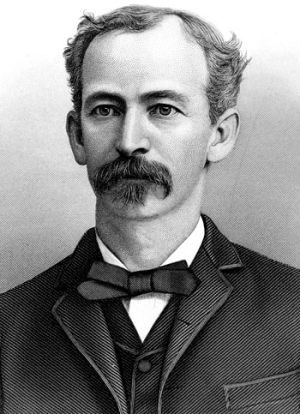George Kelley
George C. Kelley (born July 30, 1847 in Wilmington, North Carolina; died February 8, 1923 in Wilmington, North Carolina) was a hardware dealer, president of the Baxter Stove Works, and an investor in the development of East Birmingham.
Kelley was the second of nine children born to George H. and Julia Agnes Cason Kelley. He worked with his father, a general merchant, before entering the hardware business with George Peck in Wilmington. From there he was invited to join the Atlantic Coast Railroad as secretary to the president for two years, after which he was employed as auditor for the Wilmington & Weldon Railraod Company.
Kelley married the former Icoline Bates of Wetumpka, Elmore County in 1874. He resigned his position with the railroad in 1878 and was given charge of account books for William Hall & Co. hardware merchants in Montgomery.
Kelley moved his family, with a young son, George Bates, to Birmingham in 1881. Another son, Wilbur Edrald, was born hat year. Kelley established his hardware business in a 3-story modern iron and plate glass building at 1917 2nd Avenue North. He also constructed a 12-room mansion, Magnolia Heights, on a 10-acre parcel off the terminus of the Fountain Heights streetcar line.
In 1883 Kelley partnered with F. M. Thompson and A. H. Clisby in the Alabama & Coosa Coal Company, which aimed to develop mines in the Coosa coal fields. He was also a partner in the East Birmingham Land Company and was named president of the East Birmingham Railroad Company in 1886. He sold his hardware business to the Towers Hardware Company in January 1887, and went on to found the Baxter Stove Works and the St Clair Mining and Mineral Company.
In 1907 Kelley sent an open letter to Mayor George Ward and the Birmingham Board of Aldermen recommending specific cuts to each of the city's departments to reduce expenditures during the recession which followed the Panic of 1907. In 1913 Kelley was awarded a franchise from the City of Birmingham to construct a streetcar line that would connect to Elmwood Cemetery, but the 1913–1914 recession prevented him from raising enough capital to proceed.
Kelley erected a mausoleum vault at Birmingham's Oak Hill Cemetery at the death of his infant son, Irwin, in 1885. Icoline died at home after a short illness in 1889 and was interred there as well. By the time he died in 1923, however, George Kelley had returned to Wilmington and was buried at Oakdale Cemetery there.
References
- "Another Big Scheme: A Magnificent 5,000 Acre Coal Field to be Developed Soon" (June 21, 1883) Birmingham Iron Age, p. 3
- Dubose, John Witherspoon (1887) Jefferson County and Birmingham, Alabama: Historical and Biographical Birmingham: Teeple & Smith, Publishers; Caldwell Printing Works.
- "Suggestion Made for City Retrenchment" (November 16, 1907) The Birmingham News, p. 10
External links
- George C. Kelley at findagrave.com
